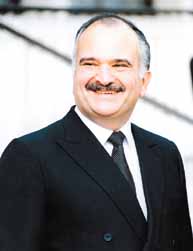Prince Hassan named head of Club of RomeBy Francesca Sawalha |
|
AMMAN — HRH Prince Hassan was appointed on Tuesday
as president of the international think-tank the Club of Rome at a
ceremony in Madrid under the patronage of Spain's King Juan Carlos
and Queen Sofia.

The king congratulated the members of the Club on their “excellent choice,” saying that Prince Hassan's appointment was a confirmation of his “vision as a peacemaker and a great intellect, representing all parts of the world, especially the region of your ancestors.” Prince Hassan replaces Ricardo Diez-Hochleitner, Spain's media mogul who has been heading the Club since 1991. “I am delighted that Prince Hassan, whom I hold in high esteem as a long time colleague and friend, will lead this immensely important and prestigious organization into a new era,” said Diez-Hochleitner, also an intellectual and the founder of the Santillana Foundation. “He (Prince Hassan) is a statesman, an intellectual, a promoter of human dignity and a peacemaker,” he told the Club's meeting on Tuesday. The prestigious group, best known for its groundbreaking work on sustainable development and growth in the 1970s, also announced in a press statement yesterday that, for the first time in its 32-year history, it appointed two vice presidents: Alicia Barcena from Mexico and Eberhard von Koerber from Switzerland. Barcena's career within the UN and the NGO sector has focused on public policies for sustainable development, while von Koerber is a prominent public sector representative. “The Club of Rome and its members have no dogma — we believe in the `power of ideas' and in the concept of `think globally, and act locally',” Diez-Hochleitner said. “I thank Ricardo for his attention to continuity, innovation and change,” replied Prince Hassan, upon becoming the fourth president in the Club's history. “Over the last three decades, the Club of Rome established an interactive conversation with 25 chapters around the world working to encourage the contribution of a cross-section of the world's societies towards a universalisation of values. Our interest is to contribute to international and humanitarian concerns.” The executive committee meeting on Tuesday was held in Madrid on the sidelines of a Santillana conference called “The 15th Monographic Week” to discuss “Learning for the Future: Education in Favour of Human Dignity,” the opening session of which was chaired by Prince Hassan. The Prince anticipated that his presidency intended to take the Club one step forward, from its focus on world “problematique” to concentrating on problem-solving. So far, the Club of Rome's mission has been to contribute to what it calls the “world problematique,” the complex set of crucial problems — political, social, economic, technological, environmental, psychological and cultural — facing mankind. “Now is the time to talk to each other and move from the world problematique to the world of problem solving,” Prince Hassan told the executive council meeting. “I propose that along with long-term thinking, the members of the Club of Rome consider the many `what if?' scenarios. The intent here is to build bridges between the physical environment and the human environment,” the Prince said. “Today, one cannot make major predictions in a fast-changing world. There must be an inter-regional and extra-regional discussion and problem solving thrust,” he added. The Club of Rome is best known for its 1972 report “The Limits to Growth.” The work of a group of MIT (Massachusetts Institute of Technology) scientists targeted to a non-specialist audience, the publication predicted dire consequences to unchecked economic and population growth. More than 12 million copies have since been sold in 27 languages, while the book was discussed in hundreds of seminars, roundtables, newspaper articles, radio and television programmes. “Quite wrongly, the report tended to be perceived as presenting an inescapable scenario for the future, and the Club was assumed to be in favour of zero economic growth,” says the Club's information sheet. “In fact, the projection of trends and the analysis of their cross impacts were intended to highlight the risks of a blind pursuit of growth in the industrialized countries, and to induce changes in prevailing attitudes and policies so that the projected consequences should not materialize.” As a non-profit, non-governmental organization, the Club of Rome brings together scientists, economists, businessmen, international high level civil servants, heads of state and former heads of state from all over the world. It works on global issues related to the environment, demography, development, ethical values and governance, society in the age of information technology and education. |